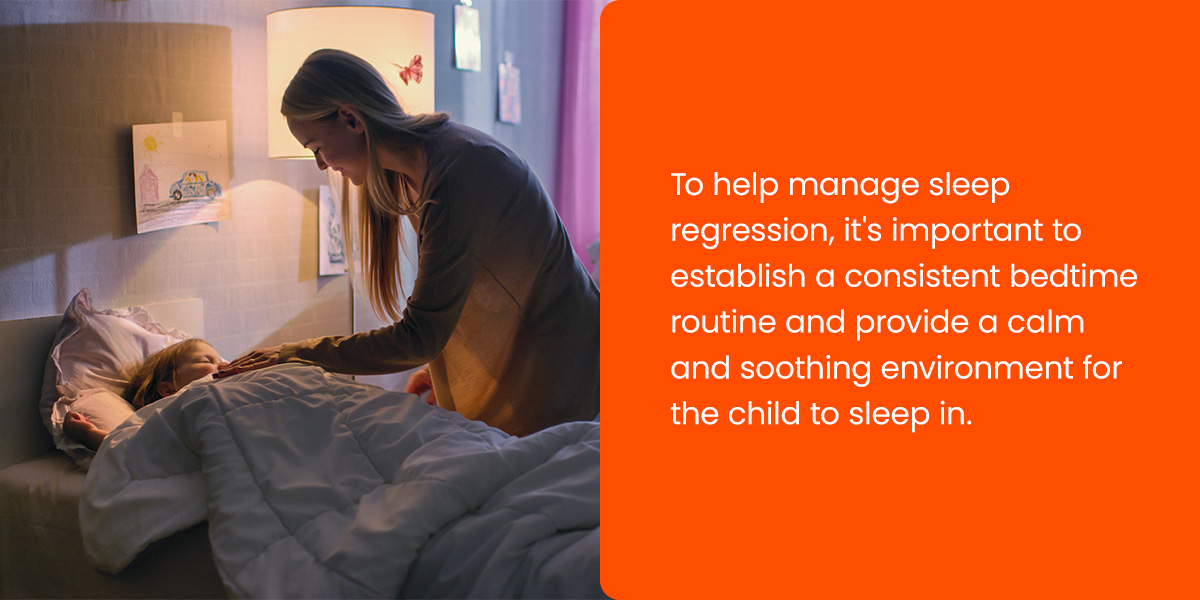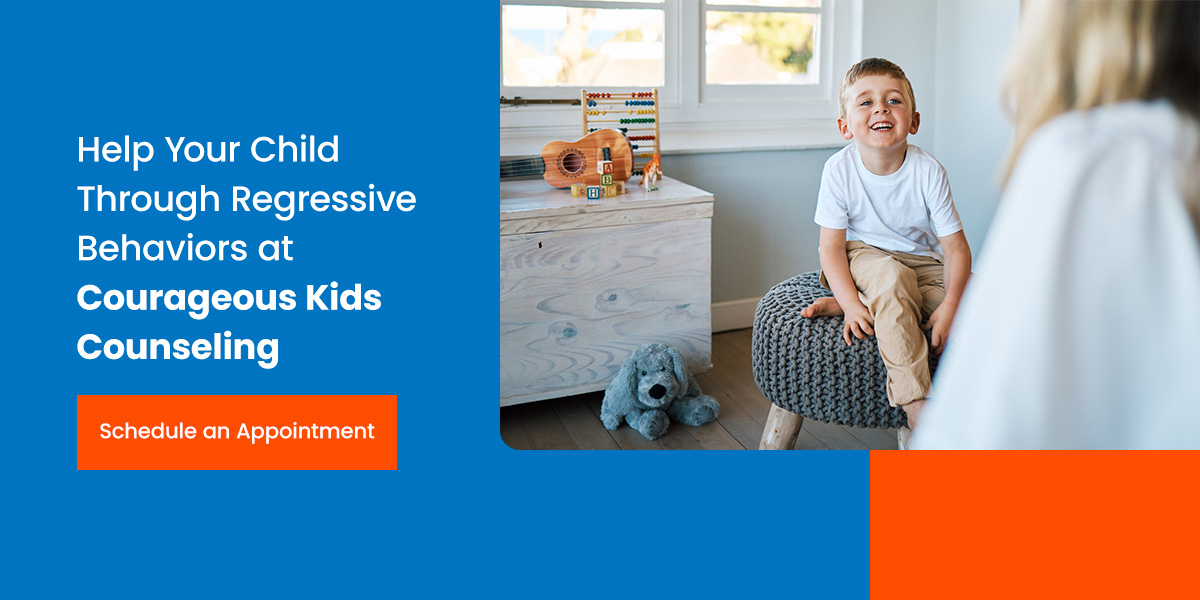Watching children grow and conquer new developmental milestones can be incredibly rewarding for parents. Becoming potty-trained and sleeping through the night in their own bed are two major achievements in the lives of young children. However, stress can cause some kids to experience setbacks in previously accomplished areas.
Regressive behavior in children can manifest in different ways and is often a response to major changes and anxiety. Some examples of regressive behavior in children include the following:
- Bedwetting
- Thumb sucking
- Temper tantrums
- Fear of sleeping alone
- Clinginess
- Loss of acquired language skills or other developmental milestones
Regressive behaviors can be confusing, challenging and disheartening for parents. If you believe your child may be regressing, read on to learn more about common regressive behaviors and how your family can manage them.
What Is Regressive Behavior?
Regression is a psychological defense mechanism in which a person retreats to an earlier developmental stage to cope with stressful or anxiety-provoking situations. Regressive behavior in children refers to when a child begins to act in a younger or less mature way than they have previously. This may include temper tantrums, difficulties with sleeping or eating and reverting to more immature ways of talking. Additionally, if a child has already mastered a certain skill, such as dressing themselves, they may lose those abilities.
Regression in kids can be a normal and temporary condition and may occur during periods of stress, such as starting a new daycare, welcoming a new sibling into the home, divorce or similar.
Common Regressive Behaviors
Children who regress commonly display behavioral changes in toileting, sleeping and co-sleeping.
Toileting
Toileting regression is a common issue parents of toddlers and preschoolers face. It refers to the sudden and unexpected return of toileting accidents after a child has been successfully potty trained. This can be frustrating for parents, but it’s important to understand that toileting regression is a normal part of the learning process.
Potty training regression can occur for several reasons. One reason is that the child may experience a significant change or stressor, such as starting a new school or the arrival of a new sibling. Another reason is that the child may feel anxious or overwhelmed, causing them to revert to familiar and comforting behaviors.
Staying calm and patient is important to help manage potty training regression. Punishing or shaming a child for accidents can create more stress and anxiety, worsening the regression. Instead, parents can try to identify any stressors in the child’s life and provide plenty of support and reassurance. Returning to the basics of potty training may be helpful, such as reminding the child to use the bathroom regularly and offering positive reinforcement for successful toileting.
Overall, potty training regression is a normal part of the learning process and can happen for various reasons. Toileting regression can often be a healthy way for children to meet their emotional needs when their lives get overwhelming. With patience, support, and a return to the basics of potty training, parents can help their children successfully navigate this challenging stage.
Sleeping
 Sleep regression describes periods where a child’s regular napping and nighttime schedule temporarily change. They may skip or cut naps short, wake up repeatedly overnight or awaken extra early in the morning. While sleep regression can be worrisome for parents who have established a good sleep routine for their child, it’s a normal part of a child’s development.
Sleep regression describes periods where a child’s regular napping and nighttime schedule temporarily change. They may skip or cut naps short, wake up repeatedly overnight or awaken extra early in the morning. While sleep regression can be worrisome for parents who have established a good sleep routine for their child, it’s a normal part of a child’s development.
Sleep regression can occur in children 1 to 3 years old for several reasons. For example, new and physically taxing developments such as growth spurts, teething, crawling or walking can intimidate children, causing them to revert to a more familiar stage. Additionally, changes to a child’s routine or environment, such as travel or a new caregiver, can cause sleep regression.
To help manage sleep regression, it’s important to establish a consistent bedtime routine and provide a calm and soothing environment for the child to sleep in. Parents can also try to anticipate and address any potential disruptions to the child’s routine, such as scheduling naps around travel plans. Offering comfort and reassurance to the child during periods of sleep regression is also helpful.
By sticking to a regular bedtime routine and providing a restful, comfortable environment, parents can help their children navigate through periods of sleep regression and establish healthy sleep habits for the future.
Co-Sleeping
Co-sleeping is a common practice in many cultures and can be a personal choice for some families. Co-sleeping refers to a scenario in which children desire to sleep close to their parents, either in the same bed or room. It’s common in infancy and early childhood and typically declines as children start school. However, anxious children ages 6 to 12 are especially prone to co-sleeping to help them cope with anxiety.
Some experts view co-sleeping as a regressive behavior that can negatively affect both the child and the parent. Co-sleeping can intensify anxiety and lead to other behavioral problems, such as attachment issues and sleep disturbances. It’s been associated with the following concerns:
- Difficulty initiating sleep
- Sleeping less overnight
- Feeling sleepy during the day
- Resisting bedtime
- Awakening frequently during the night
- Experiencing sleep anxiety
Parents who co-sleep with their children may also experience disrupted sleep and difficulties in maintaining intimacy with their partners.
To avoid these negative consequences, parents should establish healthy sleep habits for their children, including creating a regular bedtime routine and providing a comfortable environment for sleep. If parents choose to co-sleep, they should take necessary precautions, such as using a sidecar or bed rail to prevent falls and avoiding alcohol or drugs before bedtime.
Ultimately, parents should consider the potential risks and benefits of co-sleeping and make an informed decision that is best for their family.
Help Your Child Through Regressive Behaviors at Courageous Kids Counseling
While regression can be frustrating and concerning, remembering that it’s a normal part of a child’s growth can reassure parents as they navigate regressive behaviors. Stress and anxiety surrounding a recent change are often the cause of regression. Parents can support their children by acknowledging their concerns and helping them adjust to changes.
If you’re a parent who needs a little extra support in helping your child manage stress and anxiety, the clinicians at Courageous Kids Counseling are here to help. We specialize in providing family therapy to children with anxiety and depression.
We offer free consultations, flexible virtual appointments and in-person visits at our office in Nyack, New York. Contact Courageous Kids Counseling today to learn more about our services and how we can help your child reach new heights and find joy!




